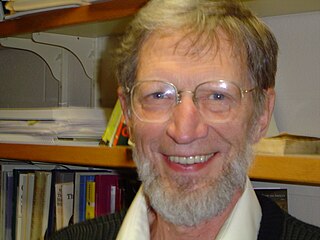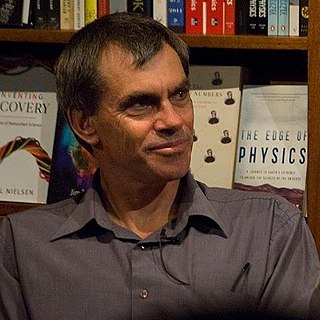Gödel's ontological proof is a formal argument by the mathematician Kurt Gödel (1906–1978) for the existence of God. The argument is in a line of development that goes back to Anselm of Canterbury (1033–1109). St. Anselm's ontological argument, in its most succinct form, is as follows: "God, by definition, is that for which no greater can be conceived. God exists in the understanding. If God exists in the understanding, we could imagine Him to be greater by existing in reality. Therefore, God must exist." A more elaborate version was given by Gottfried Leibniz (1646–1716); this is the version that Gödel studied and attempted to clarify with his ontological argument.
Neutral monism is an umbrella term for a class of metaphysical theories in the philosophy of mind, concerning the relation of mind to matter. These theories take the fundamental nature of reality to be neither mental nor physical; in other words it is "neutral".
The problem of evil is the philosophical question of how to reconcile the existence of evil and suffering with an omnipotent, omnibenevolent, and omniscient God. There are currently differing definitions of these concepts. The best known presentation of the problem is attributed to the Greek philosopher Epicurus. It was popularized by David Hume.

Alvin Carl Plantinga is an American analytic philosopher who works primarily in the fields of philosophy of religion, epistemology, and logic.

John Leslie Mackie was an Australian philosopher. He made significant contributions to ethics, the philosophy of religion, metaphysics, and the philosophy of language. Mackie had influential views on metaethics, including his defence of moral scepticism and his sophisticated defence of atheism. He wrote six books. His most widely known, Ethics: Inventing Right and Wrong (1977), opens by boldly stating, "There are no objective values." It goes on to argue that because of this, ethics must be invented rather than discovered.

William Lane Craig is an American analytic philosopher, Christian apologist, author, and Wesleyan theologian who upholds the view of Molinism and neo-Apollinarianism. He is a professor of philosophy at Houston Christian University and at the Talbot School of Theology of Biola University.

In the philosophy of mind, panpsychism is the view that the mind or a mind-like aspect is a fundamental and ubiquitous feature of reality. It is also described as a theory that "the mind is a fundamental feature of the world which exists throughout the universe". It is one of the oldest philosophical theories, and has been ascribed to philosophers including Thales, Plato, Spinoza, Leibniz, William James, Alfred North Whitehead, Bertrand Russell, and Galen Strawson. In the 19th century, panpsychism was the default philosophy of mind in Western thought, but it saw a decline in the mid-20th century with the rise of logical positivism. Recent interest in the hard problem of consciousness, and developments in the fields of neuroscience, psychology, and quantum mechanics have revived interest in panpsychism in the 21st century.
The existence of God is a subject of debate in the philosophy of religion and theology. A wide variety of arguments for and against the existence of God can be categorized as logical, empirical, metaphysical, subjective or scientific. In philosophical terms, the question of the existence of God involves the disciplines of epistemology and ontology and the theory of value.

Classical theism is a theological and philosophical form of theism that conceives of God as the ultimate, transcendent reality, characterized by attributes such as omnipotence, omniscience, and perfect goodness. Rooted in the ancient Greek philosophy of Plato and Aristotle, classical theism presents God as a being who is immutable, impassible, and entirely self-sufficient. This understanding of God emphasizes divine simplicity, where God's essence and existence are identical, making Him fundamentally distinct from all created beings.
William F. Vallicella is an American philosopher.

Graham Robert Oppy is an Australian philosopher whose main area of research is the philosophy of religion. He is Professor of Philosophy and Associate Dean of Research at Monash University, CEO of the Australasian Association of Philosophy, Chief Editor of the Australasian Philosophical Review, Associate Editor of the Australasian Journal of Philosophy, and is on the editorial boards of Philo, Philosopher's Compass, Religious Studies, and Sophia. He was elected Fellow of the Australian Academy of the Humanities in 2009. Oppy is considered by some philosophers to be the most formidable defender of atheism living today.
Nick Trakakis is an Australian philosopher who is Assistant Director of the Centre for Philosophy and Phenomenology of Religion of the Australian Catholic University. He has previously taught at Monash University and Deakin University, and during 2006–2007 he was a postdoctoral research fellow at the Centre for Philosophy of Religion at the University of Notre Dame. He works mainly at the intersections of philosophy, religion, and theology.
The following outline is provided as an overview of and topical guide to atheism:
Atheism, in the broadest sense, is an absence of belief in the existence of deities. Less broadly, atheism is a rejection of the belief that any deities exist. In an even narrower sense, atheism is specifically the position that there are no deities. Atheism is contrasted with theism, which in its most general form is the belief that at least one deity exists.
Agnostic atheism — or atheistic agnosticism — is a philosophical position that encompasses both atheism and agnosticism. Agnostic atheists are atheistic because they do not hold a belief in the existence of any deity, and they are agnostic because they claim that the existence of a divine entity or entities is either unknowable in principle or currently unknown in fact.
In the philosophy of religion, an ontological argument is a deductive philosophical argument, made from an ontological basis, that is advanced in support of the existence of God. Such arguments tend to refer to the state of being or existing. More specifically, ontological arguments are commonly conceived a priori in regard to the organization of the universe, whereby, if such organizational structure is true, God must exist.
Articles related to philosophy of religion include:
Skeptical theism is the view that people should remain skeptical of their ability to discern whether their perceptions about evil can be considered good evidence against the existence of the orthodox Christian God. The central thesis of skeptical theism is that it would not be surprising for an infinitely intelligent and knowledgeable being's reasons for permitting evils to be beyond human comprehension. That is, what may seem like pointless evils may be necessary for a greater good or to prevent equal or even greater evils. This central thesis may be argued from a theistic perspective, but is also argued to defend positions of agnosticism.
Australian philosophy refers to the philosophical tradition of the people of Australia and of its citizens abroad. Academic philosophy has been mostly pursued in universities. It has been broadly in the tradition of Anglo-American analytic philosophy, but has also had representatives of a diverse range of other schools, such as idealism, Catholic neo-scholasticism, Marxism, and continental, feminist and Asian philosophy.
Jordan Howard Sobel was a Canadian-American philosopher specializing in ethics, logic, and decision theory. He was a professor of philosophy at the University of Toronto, Canada. In addition to his areas of specialization, Sobel made notable contributions in the fields of philosophy of religion, and value theory. Before his death, Sobel was considered by Christian apologist William Lane Craig to be the leading philosophical defender of Atheism prior to Graham Oppy.




